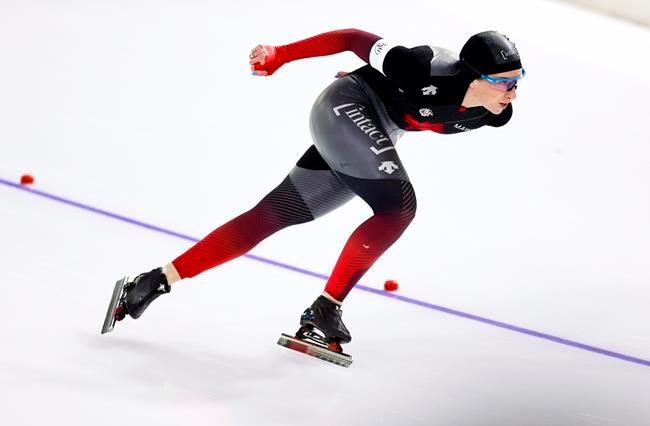CALGARY — The feeling her speedskating season is slipping away compelled world champion Ivanie Blondin to break ranks with the Canadian team.
The Ottawa athlete heads to Europe on Monday in search of sustained skating in an indoor oval, which she hasn't had in Canada.
"I've been on the ice for what, maybe four weeks, broken up, this year? I know I'm really far behind," Blondin told The Canadian Press.
"At a certain point, I had to just make my own decision and do what's best for me."
Canada's long-track team has been without ice at Calgary's Olympic Oval since Sept. 5, when the ice plant was shut down due to a mechanical issue.
Ice won't be restored before January.
Actual training on skates has been a hodgepodge of short-track workouts, inline skating on the oval's concrete and a training camp in the Fort St. John, B.C., indoor oval the first two weeks of November.
"I haven't touched the ice since Fort St. John and that's been over two weeks," Blondin said.
Speed Skating Canada chief executive officer Susan Auch says the long-track team began skating Friday on an outdoor oval in Red Deer, Alta.
Canadian skaters recently posted picturesque videos of workouts on Alberta mountain lakes, but Blondin says training on frozen lake ice has limitations.
"It's beautiful, but it's not actually productive," the two-time Olympian said.
The reigning world champion in the women's mass start wants to be racing by January in the only international competition she'll get this season because of the COVID-19 pandemic.
A season of erratic training is a stressful prospect for Blondin. The 2022 Winter Olympics in Beijing are just over a year away.
"Given our circumstances here in Canada, yes it's a risk to travel, but we don't have the facilities right now or the means to be able to skate," Blondin said. "That's a huge disadvantage going into an Olympic season."
Blondin and Hungarian skater Konrad Nagy, who trains in Calgary, married Dec. 3. They're travelling to Budapest to train with Hungary's small national team.
"The Hungarian Federation treats me like one of their own because of Konny and I, and also because the Canadian team takes care of Konny while he's here," Blondin explained.
They'll eventually head to the indoor oval in Inzell, Germany, where Blondin believes they can enter open international races.
A pair of World Cups from Jan. 22 to Jan. 31 and the world championships Feb. 11-14 are scheduled to operate in a "bubble" in Heerenveen, Netherlands.
"I will not be at my best at the World Cups," Blondin said. "I'd rather be racing and skating than staying home than stressing myself out over the Olympic season."
Auch says a decision on whether the rest of the Canadian long-track team joins Blondin in the Dutch "bubble" in January will be announced next week.
"We had a meeting with the athletes," the CEO said. "The athletes seem keen to go and we'll have a decision on that on Monday."
Blondin, 30, understands her sport federation might have reservations about her stepping away from the national-team environment in Calgary.
"We have to support what the athletes believe they need to succeed," Auch said.
"I think Ivanie is a responsible adult who knows what she needs to be successful and I think we will do anything we can to help her do it in a safe way."
Speed Skating Canada opted to not return to the Fort St. John oval in December.
One reason was the cost of housing over 40 athletes and staff amid strict isolation protocols to avoid spread of the virus.
"The camp didn't make sense for us to do again," Auch said. "It's obviously very expensive so we're trying to decide where to spend that money."
This report by The Canadian Press was first published Dec. 11, 2020.
Donna Spencer, The Canadian Press




